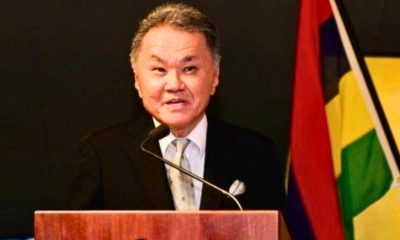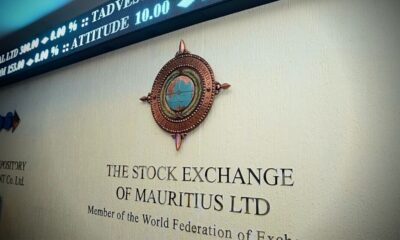Business
NewENLRogers Rebrands with Rs12 Billion Market Valuation & Regional Ambitions

The official listing of NewENLRogers on the stock exchange marks a strategic milestone for the group formed by the merger of ENL and Rogers. With a market value of Rs 12 billion, the newly created entity—currently called NewENLRogers—is aiming to do more than just unite two historic conglomerates.
This move sets the stage for a major transformation driven by a clear goal to expand regionally, with a rebranding announcement expected next week.
Gilbert Espitalier-Noël, CEO of NewENLRogers, explained, “It is always difficult to call this company NewENLRogers because, as you can imagine, that will not be its final name.”
He clarified that the current name is temporary, necessary for the company’s short-term trading and listing. “Next week, we will unveil and share the new name that this group will carry,” he added.
A 200-year-old legacy
ENL and Rogers are two major players in the local economy. “We have been active for 200 years,” said Espitalier-Noël.
The Espitalier-Noël family, now prominent, is a relatively recent chapter of that history.
“Our family is quite new—just four generations ago, an ancestor changed his name after marrying an Espitalier girl,” he joked.
Today, the focus is not just on heritage. The merger has primarily simplified what was once a complex corporate structure.
“Before, ENL had many cross-shareholdings, making it difficult for investors and analysts to understand the legal and financial setup,” Espitalier-Noël explained.
“The new structure is much simpler and easier to grasp.”
Regional ambitions
The most significant shift, however, is the group’s declared ambition to become a major regional player. Already operating in 13 countries—mainly in Africa and also in India—NewENLRogers intends to expand beyond Mauritius.
“We will leverage synergies among our various entities and take on a bigger regional role,” Espitalier-Noël said.
“We plan to grow cautiously, because expansion comes with risks, but regional growth is crucial for us.”
For Espitalier-Noël, this expansion is a strategic necessity. “A group like ENL or Rogers needs strong, ambitious regional growth. We are working very hard on this. We are not just here for shareholders; we also serve the country.”
The group’s activities span seven sectors: Agribusiness, Real Estate, Hospitality & Travel, Logistics, Finance, Commerce & Industry, and Technology & Energy.
It also holds significant stakes in key associated companies, including Eclosia Group, New Mauritius Hotels, and Swan Group. The goal is clear: sustain local growth while expanding regionally.
“We see ourselves as a major player in Mauritius and a contributor to the nation’s benefit. Although we aim for regional expansion, we will continue to grow locally, and NewENLRogers will remain important regionally,” Espitalier-Noël emphasized.
The rebranding will symbolize this new chapter. Changing the name marks an entry into a new era—one that blends history, social responsibility, and regional growth for this conglomerate.
NewENLRogers joins the top 10 on the Mauritian stock exchange
The listing of NewENLRogers on the Mauritius Stock Exchange (SEM) is seen as a major event. Sunil Benimadhu, CEO of the SEM, praised Rogers and ENL as pioneers of the local stock market.
“Companies like Rogers and ENL—through their predecessors like Savannah, Mon Desert Alma, and others—played a key role in creating the SEM.
They were among the first to open up their share capital to the public and helped democratize share ownership in Mauritius,” he said.
With a market capitalization of Rs 12 billion, NewENLRogers is now among the top ten listed companies.
It is also expected to quickly join the SEM-10 index and the SEM Sustainability Index (SEMSI). Benimadhu also called on Finance Minister Jyoti Jeetun to consider issuing Mauritius’s first Sovereign Sustainable Bond and listing it on the SEM.
“This would boost Mauritius’s international image as a sustainable island and help develop our International Financial Centre by diversifying our financial products,” he said.
Finance Minister Jyoti Jeetun welcomed NewENLRogers’ listing but highlighted sector challenges.
She stressed the importance of avoiding overregulation, which could harm Mauritius’s attractiveness as a financial hub.
“Maintaining the integrity of our financial system is critical, and we’re working hard to do so. But business facilitation is essential for growth and development. We need to balance compliance with innovation, risk management with investor confidence,” Finance Minister said.
Minister Jeetun also pointed out that the financial sector accounts for nearly 14% of GDP, employs 20,000 people directly, and generates 68% of corporate tax revenue.
A wake-up call for Mauritius’s stock market
Jeetun made a bold speech that caught attention. She told the financial community that, although Mauritius’s stock exchange has a good reputation for innovation, automation, and governance, that’s no longer enough.
“Foundations alone do not build futures,” she said. “We need a renewed purpose and collective ambition to transform our capital markets into a key driver of future economic growth,” she urged.
Established in 1989, the Mauritius Stock Exchange is struggling to fulfill its economic role. Jeetun criticized the market’s heavy concentration in a few historic large companies, while many small and high-growth firms remain absent.
“The market is dominated by a few legacy names, and too many SMEs and fast-growing firms are missing,” Minister Jeetun highlighted.
The bond market is also underperforming. Jeetun noted that bond issuance is rare, and the secondary market is “largely inactive.”
This is surprising for a supposedly sophisticated economy. “Our market, despite its institutional strength, is not reflecting our economic sophistication,” she questioned.
The minister also raised concerns about Mauritian entrepreneurs’ low engagement with the stock market.
Despite a strong entrepreneurial culture, few companies use the capital markets to finance expansion or internationalization. “We need to ask why, and more importantly, what we can do about it,” she said.
Another challenge is the low participation of individual investors. The recent pension reform, announced in the latest budget, sparked wider debate on Mauritians’ financial culture.
Jeetun explained that “many Mauritians have not yet embraced long-term financial planning.” She called for improved financial education, easier access through mobile trading, and the creation of investment products suited for middle-income classes.
“We need more low-risk, long-term options for savers today,” she concluded, urging market players to work together to build a more inclusive and dynamic stock market.
Source: Le Mauricien











